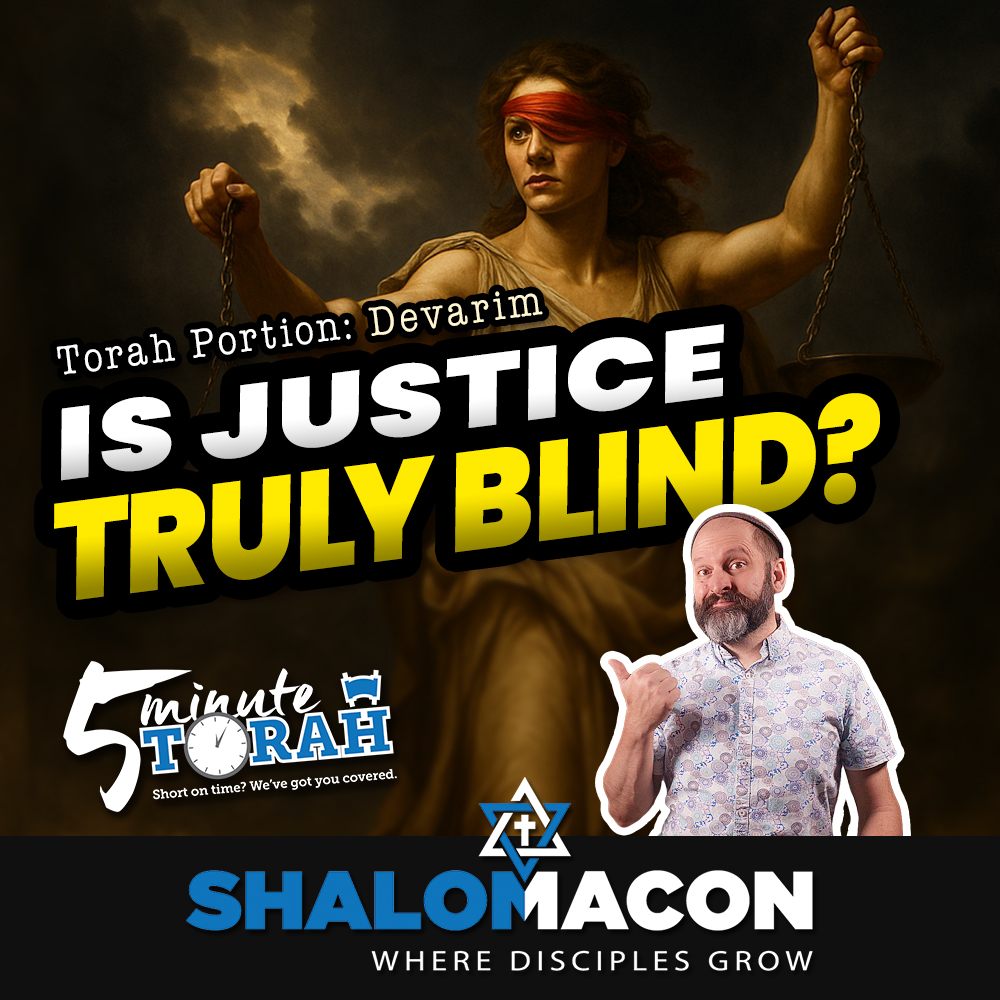Episode Transcript
[00:00:00] What happens when justice tips the scales to protect the underdog? We've seen it in headlines. Verdicts swayed not by truth but by sympathy. Cases where guilt is clear, yet the outcome bends to protect someone because of their status, their story, or maybe even their suffering. Devarim warns against this very thing. It says, hear the small and the great alike. Justice must be blind to power and and blind to pity. This week's Torah portion shows us how God's justice refuses to be swayed and how Yeshua models perfect equity, judging in truth and righteousness. Join me as we learn about the judge who cannot be bribed in this week's five minute tour.
[00:00:48] Shalom and blessings from Shalom Macon, the place where disciples of Yeshua learn, connect and grow. I'm Darren and before I get into the five minutes of my five minute Torah commentary, let's cover a few quick facts about this week's Torah portion. This week we are studying the 44th portion of the Torah cycle and the first portion of the Book of Deuteronomy. We're in the portion of Devarim, Deuteronomy 1:1 through 3:22 and here are the three things that you need to know about it. Number one 40 years in review Lessons from the Wilderness Devarim begins with Moses delivering a sweeping review of their 40 year journey, reflecting on their time in the wilderness and recounting significant events from their past. But this isn't just history, it's a mirror. He revisits the highs, the failures, and the mercy of God, all to prepare them for life in the land. The question is, will they carry the same stubbornness and disobedience into the land? Or or will they step forward as a people transformed by their wilderness journey? Number two Hidden in plain sight the Code of Rebuke the Torah portion opens with a puzzling list of place names, some of which don't appear anywhere else in the scriptures. The sages explain that these aren't geography lessons, but carefully coded rebukes. Each place name recalls a specific failure in Israel's past. The Golden Calf, the complaints, the rebellions, etc. Rather than publicly shaming the people, Moses wraps his corrections in subtle hints, protecting their dignity while still calling them to repentance. What does this teach us about the art of correcting others with both truth and compassion? And number three the Covenant Renewed Preparing the next generation Devarim isn't just a history lesson, it's a covenant renewal ceremony. The generation that heard Sinai's thunder is nearly gone. Now Moses speaks to their children. The binding them to the same covenant. But the message is more than words on stone. It's a call to their own faith, not just an inheritance. What does this teach us about passing our faith on to the next generation? What does it really mean to live by the spirit of the Law and not the letter of the Law? For centuries, believers have been told that the law of God is a burden and something. Yeshua came to set us free from those. But what if that's not what the Scriptures say at all? What if Paul's words about the letter of the law killing were never meant to pit God's spirit against his own commandments? In my new book, Spirit of the Law, I take a closer look at the writings of Paul, the teachings of Yeshua, and the Torah itself to uncover a consistent truth. The problem was never God's law. It was the human heart. And rather than repealing his Father's commandments, Yeshua came to transform our rebellious heart and empowering his disciples to walk in the fullness of the Spirit of the Law. But in order to accomplish this, we first need to understand what it means. If you've ever struggled to reconcile law and grace, Spirit of the Law will open your eyes to a richer, more faithful understanding of both. It will challenge assumptions, bring clarity to misunderstood passages, and invite you into a deeper walk of obedience, one that's alive with the Spirit of God. Pick up your copy today and let the Spirit of the Law transform the way you see God's word and and the way you live it. It may just be the missing key you've been looking for to unlock the Scriptures and open a whole new world of biblical understanding. Once it clicks, you'll want to invite others to join the journey as well. This week's Torah commentary is called Can Justice Truly Be Blind? And comes from a book, Five Minute Torah, Volume 3. The Book of Devarim or Deuteronomy is often called Mishnah Torah or the Second Law, due to its repetition of many of the things already expressed within the first four books of the Torah Torah. However, it does not merely recount the same events and dialogues, but adds detail and clarification to the previous events. When recalling the appointment of Judges, Moses gives a detail not found previously in the Torah. He said, you shall not be partial in judgment. You shall hear the small and the great alike. You shall not be intimidated by anyone, for the judgment is God's. This is Deuteronomy 1:17.
[00:04:56] Yes. Several instances before this address the issue of being impartial in judgment, such as Leviticus 19:15 you shall not do injustice in court. You shall not be partial to the poor or defer to the great, but in righteousness shall you judge your neighbor. But until now we haven't been exposed to this specific language. What are the small and the great? Are they small and great cases or small and great people? The Torah doesn't specify, so it's left up to interpretation. Both Rashi and Targum Ankylos understand to mean small and great people. Judges are not allowed to show favoritism among litigants. Judging with impartiality is crucial to a fair and legitimate system of justice. Even the popular image of lady justice, the personification of justice, bears a blindfold in many instances to represent this basic requirement expected of those in seats of judgment. Yeshua taught, do not judge by appearances, but judge with right judgment. In John 7:24 in order to maintain equity in judgment, judges must fear God more than man. When King Jehoshaphat began his reforms in Judah, one of the first things he did was appoint righteous judges. He sternly admonished them in the same manner. Consider what you do for you judge not for man, but for the Lord. He is with you in giving judgment. Now then, let the fear of the Lord be upon you. This is 2nd Chronicles 19, verses 6 and 7. Minrash Tanchuma in Mishpatim 6:11 quotes Rabbi Jonathan declaring that the very presence of God is either welcomed or rejected through the proper verdicts of Israel's judges. Every judge who renders a just verdict causes the shekhinah, or the divine presence, to hover over Israel. As it is said, God stands in the congregation of God in the midst of the judges. He Judges from Psalm 82, 1 But every judge who renders an unjust verdict causes the shekhinah to depart, as it is said, for the oppression of the poor, for the sighing of the needy. Now will I arise, says the Lord. This is from Psalm 12:6. Rashi, however, commenting on this verse, brings up a good point. How do we reconcile this issue of impartiality with the fact that even minor judgments against the poor could be devastating? And it seems that Scripture frequently advises judging in favor of the poor. Proverbs tells us, open your mouth, judge righteously defend the rights of the poor and the needy. This is Proverbs 31. 9 Isaiah, when speaking of the Messiah, says, with righteousness he shall judge the poor and decide with equity for the meek of the earth. This is Isaiah 11:4 James, the brother of our Master, contends, I are not the rich, the ones who oppress you and the ones who drag you into court? Are they not the ones who blaspheme the honorable name by which you are called? This is James 2, 67 how do we contend with passages such as these?
[00:08:01] Rashi knows that some judges will be tempted to decide in favor of the poor simply because of their social and financial status. But he also realizes that some judges will be tempted to rule in favor of the rich and in principle, but overextend their authority to have them reimburse the expenses of the poor after the trial. Neither of these situations, however, is acceptable. According to the Scripture, God is a God of justice, and if judgment has partiality, then the whole system collapses. From the beginning, Moses reminds us, the judgment is God's those in authority are to judge with equity and without pardon. Partiality is justice blind. It shouldn't be blind to the truth or to the facts that help determine the proper course of action. However, it should be blind to the status of the litigants. Whether we are coming before a human judge or the divine Judge, we all begin on equal ground. One day Yeshua will judge the world with equity. As he told his disciples, I can do nothing on my own. As I hear, I judge and my judgment is just, because I seek not my own will but the will of him who sent me. This is John 5.
[00:09:13] Until that time appears, we pray three times a day in the Amidah for righteous Judges to rule over us. We say, restore our judges as at first and our counselors as at the beginning, and remove from us sorrow and groan. May you, O Lord, reign over us with kindness and compassion and justify us with judgment. Blessed are you, O Lord, the King who loves righteousness and judgment. May the righteous Judge return to establish his rule in our days.
[00:09:45] The days of Psalm Tammuz Tisha bav. In the three weeks mark some of the most tragic events in Jewish history. Yet they're also filled with hope. If you've never explored their meaning. Our video Blessed Are those who Mourn will guide you through this powerful lesson. With vivid visuals and a heartfelt message, it will give you a new perspective on one of the most moving times in the biblical calendar. Just click the link right here to check it out.



